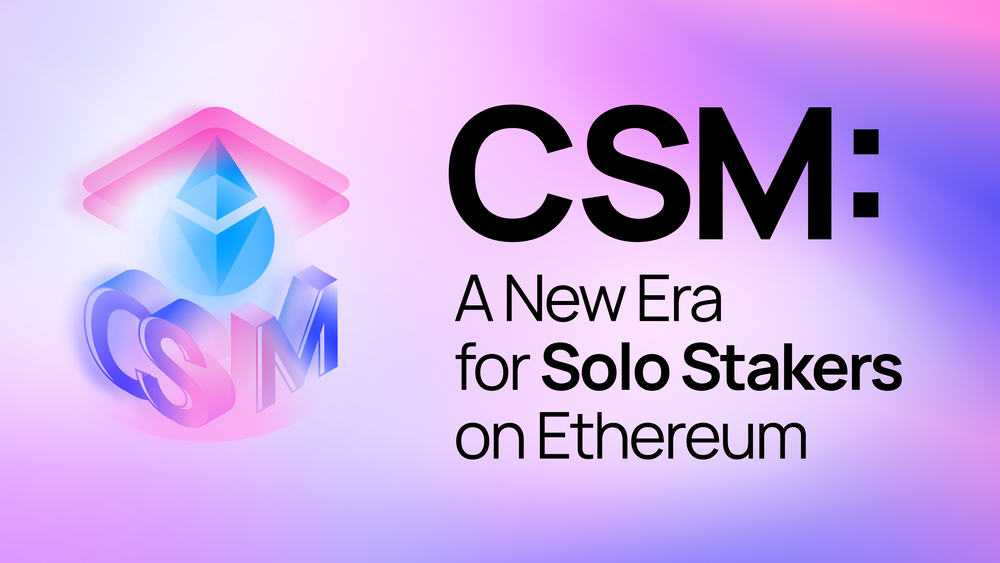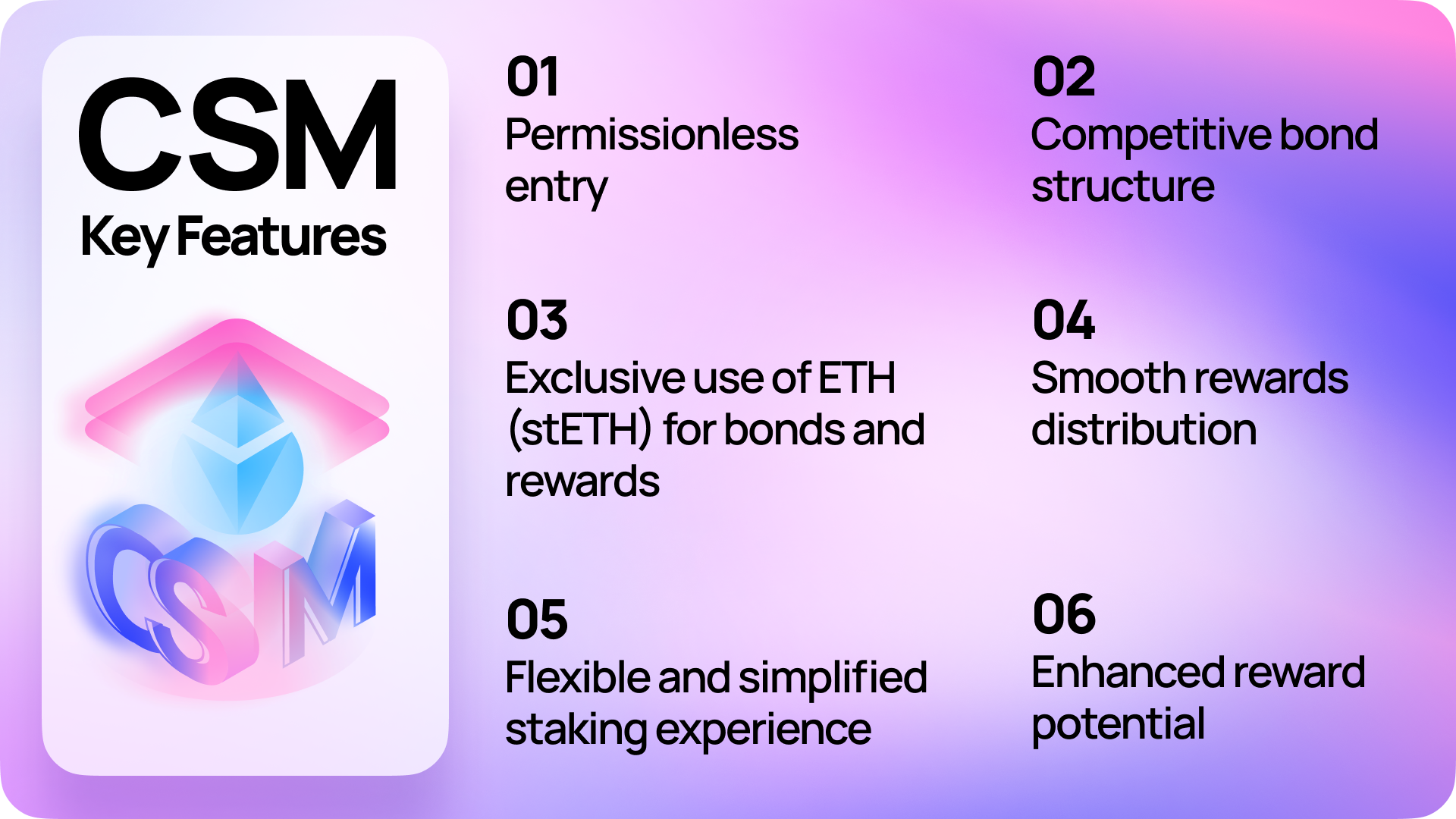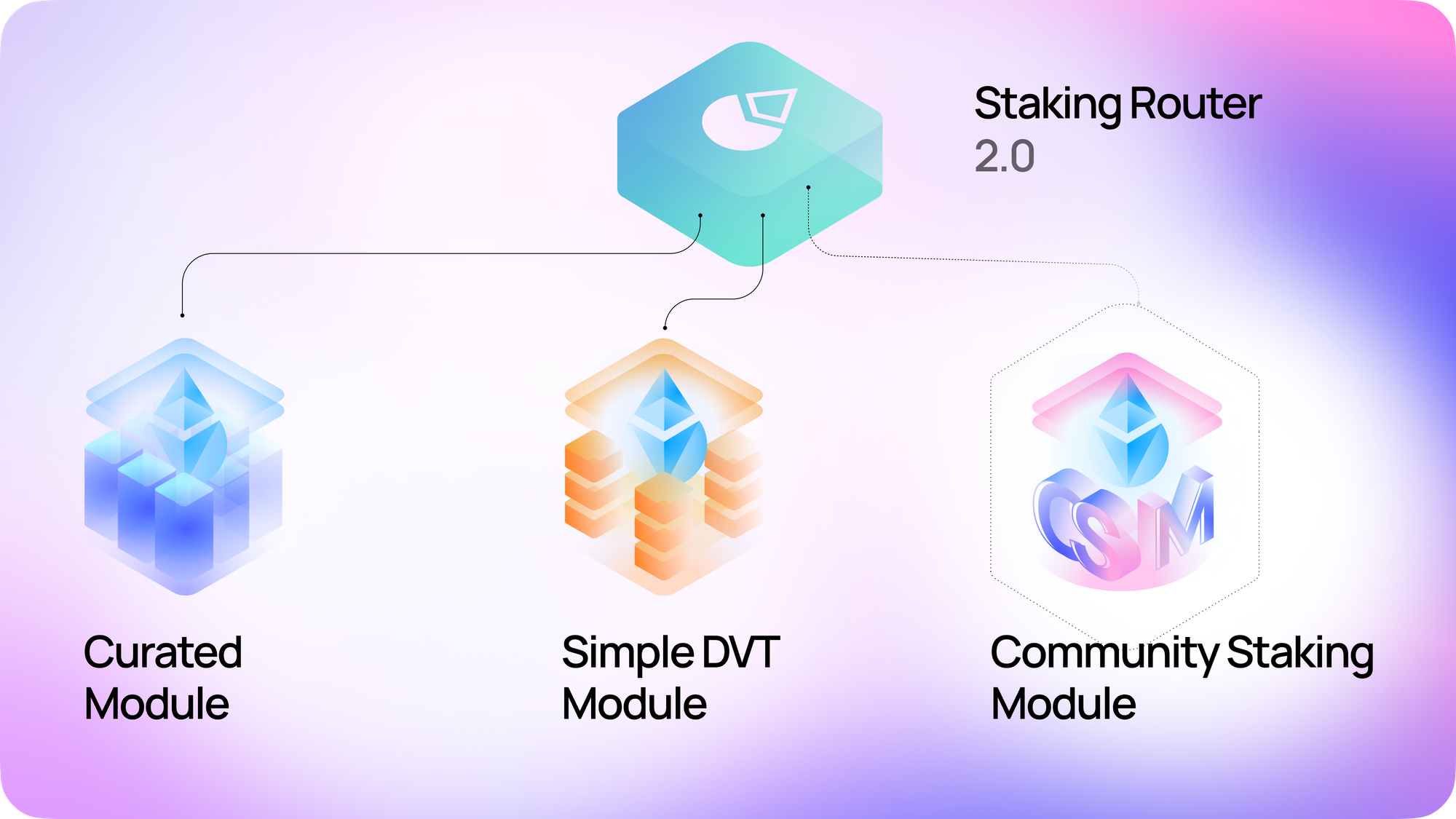Community Staking Module: A New Era for Solo Stakers on Ethereum

CSM: Overview
- The Community Staking Module is live on mainnet! Start your Ethereum validation journey with CSM, following the onboarding checklist.
- The CSM mainnet will begin with an Early Adoption stage, allowing identified solo stakers and those who performed well during the testnet to participate first.
- CSM is the first module to provide permissionless access for Node Operators, particularly solo stakers, allowing them to run validators using the Lido protocol with a minimum capital requirement of just 1.3 ETH and potential increased rewards.
- CSM continues to further the Lido DAO’s mission of keeping Ethereum decentralized by introducing a new category of Node Operators, thereby increasing the total number of Ethereum validators.
- As one of the key features of the Lido V2 upgrade, the Staking Router highlights its modular architectural strength in accelerating the diversification of the Node Operator set by seamlessly integrating CSM and the Simple DVT module in 1.5 years, with additional modules to follow.
Whether you're a seasoned staker or new to the ecosystem, CSM presents an unprecedented opportunity to run Ethereum validators using the Lido protocol in a permissionless and cost-effective manner. In this way, anyone is encouraged to participate in Ethereum validation and security, with a lower capital requirement and the potential for boosted rewards.
Built on the modular architecture of the Staking Router, the third Lido on Ethereum staking module will continue to increase the diversity of Node Operators and validators within the protocol.
The launch of CSM promises to reshape solo staking on the Ethereum network. It marks a pivotal milestone in Ethereum node staking, aligning with the stated mission of Lido DAO to maintain Ethereum’s decentralization, accessibility to all, and resistance to censorship.
What is the Community Staking Module?
The Community Staking Module is the first module to allow any node operator to use Lido on Ethereum to run validators. It is primarily aimed at lowering entry barriers for those looking to directly contribute to Ethereum’s security, but constitutes a worthwhile proposition both for novice as well as experienced node operators.
To run a validator using CSM, Node Operators need to supply a specially crafted bond, submit the key and wait for stake allocation (i.e. 32 ETH per validator) from the protocol.
CSM includes several key features to make solo staking more accessible:
- Permissionless entry: Anyone can become a node operator to run Ethereum validators using the Lido protocol, encouraging wider community participation in Ethereum staking.
- Competitive bond structure: Node operators submit a bond in the form of ETH (or stETH) which is used to mitigate the impact of any operational mistakes, allowing Node Operators to run the first validator with a bond of just 2.4 ETH (1.5 ETH for Early Adoption members) and 1.3 ETH thereafter (more on bond parameters and risk assessment).
- Exclusive use of ETH (stETH) for bonds and rewards: No platform or governance tokens as collateral are required.
- Smooth rewards distribution: Node Operators stand to get consistent and stable rewards, in contrast to highly volatile solo staking rewards, as daily consensus layer and execution layer validation rewards are awarded amongst node operators using the Lido protocol.
- Flexible and simplified staking experience: CSM can be used via a variety of user-friendly interfaces via various integrations (e.g., DAppNode, Stereum, eth-docker, Sedge, EthPillar, and others). Interactions with CSM contracts are cheaper than most other solo staking alternatives (apart from vanilla solo staking), further increasing its accessibility as a solution. Moreover, Node Operators can run their nodes as they wish, and even alongside existing solo staking infra, without the need to install additional software.
- Enhanced reward potential: CSM’s dual reward structure enables Node Operators to get staking rewards on their bond and a share of staking rewards from user-driven stake, potentially delivering up to 2.37 times higher rewards per ETH compared to traditional solo staking.

What does CSM mean for Lido Protocol?
The introduction of CSM represents another major step forward in efforts to enhance Ethereum’s decentralization and security.
By allowing permissionless access to a diverse range of participants, the mission “Make staking simple, secure, and decentralized” is advanced.
- Strengthen decentralization: CSM opens up node staking using the Lido protocol to a wider base of operators, continuing to grow the number of Node Operators on Ethereum.
- Increase community involvement: Staking is further democratised as, through lowering barriers to entry for validation, net new individuals can now participate as Node Operators in Ethereum.
- Boost security and resilience: With a larger, more distributed validator set, CSM enhances Ethereum’s overall security and resistance to censorship.
The Staking Router, Introduced in Lido V2, is a modular architecture distributing stake across various plug-and-play modules, making pools of validators more accessible and customizable.
Augmenting the functionality of the Lido protocol as neutral middleware where stakers, developers, and Node Operators collaborate seamlessly, and contribute to a more diverse validator ecosystem.

CSM and the Simple DVT Module (which launched in February, and has since added 220 net-new Node Operators), demonstrate the potential of the Staking Router to drive rapid further decentralization of both Lido and Ethereum.
The Community Lifeguards Initiative
The Lido Community Lifeguards Initiative (CLI) was introduced to encourage greater community participation in the Lido protocol. Over the past 18 months, the dedicated efforts of the Community Lifeguards - through programs like the Community Staking Fleet and various satellite community events - have successfully brought new stakers into the Lido protocol’s ecosystem.
These participants have engaged in learning about node staking, with some even launching their first Ethereum validators on testnet using CSM.
Looking ahead, CLI is expected to continue expanding its reach by working with more communities worldwide, promoting Ethereum and staking education to a broader audience.
As a solo staker, why should I join the CSM mainnet?
Solo stakers are essential to preserving Ethereum’s censorship resistance, credible neutrality and decentralization.
However, the current 32 ETH requirement and technical complexities deter many from participating. CSM lowers the capital requirement to 2.4 ETH (even 1.5 ETH for EA participants) for the 1st validator (1.3 ETH afterwards), making validator operation more accessible to a broader audience.
Additionally, the potential lower rewards for solo staking compared to DeFi opportunities have posed a challenge for those considering whether to solo stake or not. CSM’s reward system offers a more competitive proposition for those considering node staking potentially rivalling rewards from DeFi protocols.
In short, CSM presents a win-win validation solution for Ethereum and solo stakers.
How do I join the CSM mainnet?
The CSM mainnet will begin with an Early Adoption stage, allowing identified solo stakers and those who performed well during the testnet to participate first. This Early Adoption period helps prevent larger operators from crowding out CSM’s capacity and offers solo stakers exclusive access. Afterward, the module will open to all participants.
As a previous or current solo staker, you are highly likely to be eligible for the Early Adoption program. Visit csm.lido.fi to check if you’re eligible, and check out the onboarding checklist to see how easy it is to set up your first validator with CSM!
Find Out More
- Community Staking Module: Overview
- Community Staking Module: Docs
- Community Staking Module: Proposal
- Risk assessment for community staking
- Lido Community Lifeguards Initiative
- CSM Community Discord
Disclaimer: Network staking rewards are not guaranteed, vary and are dictated by the rules of the method for validating transactions, which are developed independently by the developers of each specific blockchain network and are not subject to modification by any liquid staking protocol. Past performance is not a reliable indicator of future results.